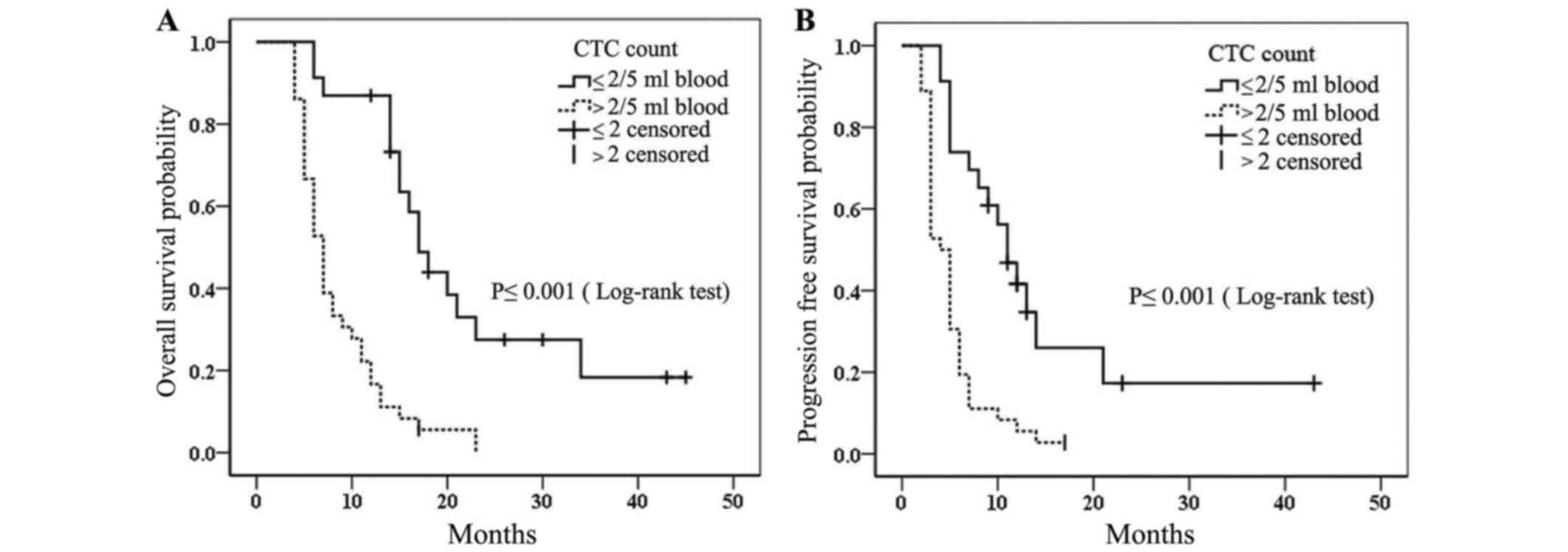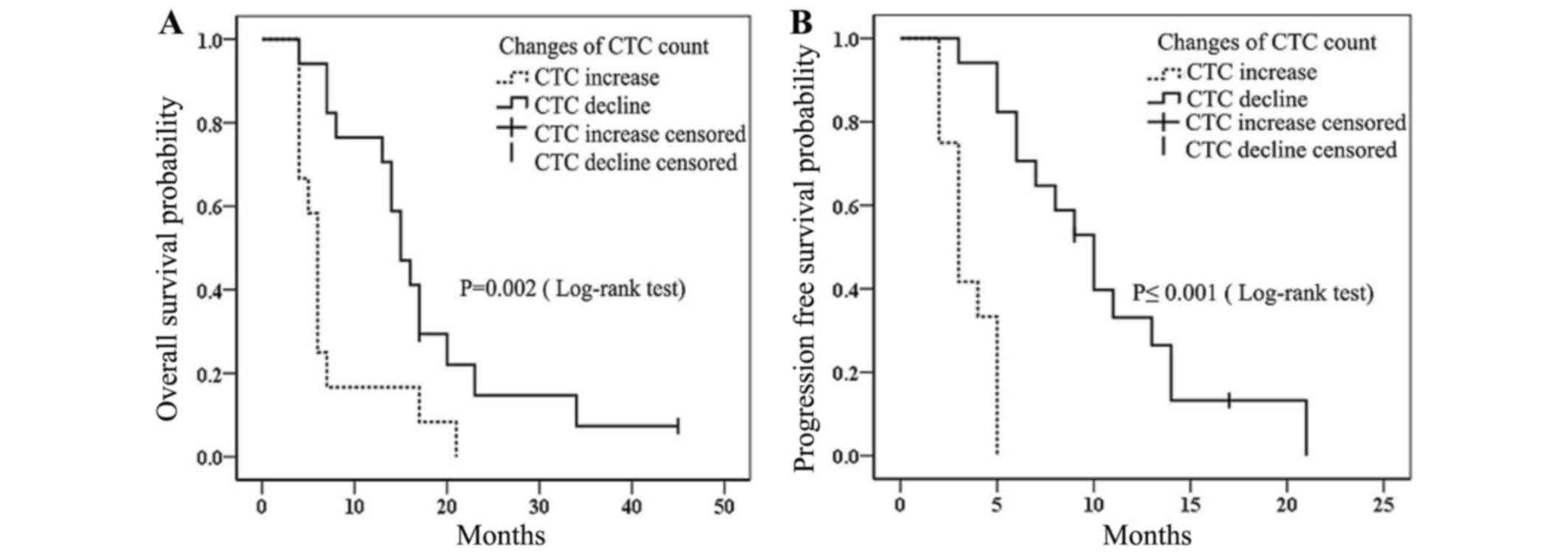|
1
|
Lordick F, Lorenzen S, Yamada Y and Ilson
D: Optimal chemotherapy for advanced gastric cancer: Is there a
global consensus? Gastric Cancer. 17:213–225. 2014. View Article : Google Scholar : PubMed/NCBI
|
|
2
|
Methy N, Bedenne L and Bonnetain F:
Surrogate endpoints for overall survival in digestive oncology
trials: Which candidates? A questionnaires survey among clinicians
and methodologists. BMC cancer. 10:2772010. View Article : Google Scholar : PubMed/NCBI
|
|
3
|
Shanbhogue AK, Karnad AB and Prasad SR:
Tumor response evaluation in oncology: Current update. J Comput
Assist Tomogr. 34:479–484. 2010. View Article : Google Scholar : PubMed/NCBI
|
|
4
|
Rahbari NN, Aigner M, Thorlund K, Mollberg
N, Motschall E, Jensen K, Diener MK, Büchler MW, Koch M and Weitz
J: Meta-analysis shows that detection of circulating tumor cells
indicates poor prognosis in patients with colorectal cancer.
Gastroenterology. 138:1714–1726. 2010. View Article : Google Scholar : PubMed/NCBI
|
|
5
|
Thalgott M, Rack B, Eiber M, Souvatzoglou
M, Heck MM, Kronester C, Andergassen U, Kehl V, Krause BJ, Gschwend
JE, et al: Categorical versus continuous circulating tumor cell
enumeration as early surrogate marker for therapy response and
prognosis during docetaxel therapy in metastatic prostate cancer
patients. BMC cancer. 15:4582015. View Article : Google Scholar : PubMed/NCBI
|
|
6
|
Okabe H, Tsunoda S, Hosogi H, Hisamori S,
Tanaka E, Tanaka S and Sakai Y: Circulating tumor cells as an
independent predictor of survival in advanced gastric cancer. Ann
Surg Oncol. 22:3954–3961. 2015. View Article : Google Scholar : PubMed/NCBI
|
|
7
|
Eisenhauer EA, Therasse P, Bogaerts J,
Schwartz LH, Sargent D, Ford R, Dancey J, Arbuck S, Gwyther S,
Mooney M, et al: New response evaluation criteria in solid tumours:
Revised RECIST guideline (version 1.1). Eur J Cancer. 45:228–247.
2009. View Article : Google Scholar : PubMed/NCBI
|
|
8
|
Lu Y, Liang H, Yu T, Xie J, Chen S, Dong
H, Sinko PJ, Lian S, Xu J, Wang J, et al: Isolation and
characterization of living circulating tumor cells in patients by
immunomagnetic negative enrichment coupled with flow cytometry.
Cancer. 121:3036–3045. 2015. View Article : Google Scholar : PubMed/NCBI
|
|
9
|
Adams DL, Stefansson S, Haudenschild C,
Martin SS, Charpentier M, Chumsri S, Cristofanilli M, Tang CM and
Alpaugh RK: Cytometric characterization of circulating tumor cells
captured by microfiltration and their correlation to the
cellsearch® CTC test. Cytometry A. 87:137–144. 2015.
View Article : Google Scholar : PubMed/NCBI
|
|
10
|
Yu M, Stott S, Toner M, Maheswaran S and
Haber DA: Circulating tumor cells: Approaches to isolation and
characterization. J Cell Biol. 192:373–382. 2011. View Article : Google Scholar : PubMed/NCBI
|
|
11
|
Gazzaniga P, Raimondi C, Nicolazzo C,
Carletti R, di Gioia C, Gradilone A and Cortesi E: The rationale
for liquid biopsy in colorectal cancer: A focus on circulating
tumor cells. Expert Rev Mol Diagn. 15:925–932. 2015. View Article : Google Scholar : PubMed/NCBI
|
|
12
|
Antolovic D, Galindo L, Carstens A,
Rahbari N, Büchler MW, Weitz J and Koch M: Heterogeneous detection
of circulating tumor cells in patients with colorectal cancer by
immunomagnetic enrichment using different EpCAM-specific
antibodies. BMC Biotechnol. 10:352010. View Article : Google Scholar : PubMed/NCBI
|
|
13
|
Heo CK, Hwang HM, Ruem A, Yu DY, Lee JY,
Yoo JS, Kim IG, Yoo HS, Oh S, Ko JH and Cho EW: Identification of a
mimotope for circulating anti-cytokeratin 8/18 antibody and its
usage for the diagnosis of breast cancer. Int J Oncol. 42:65–74.
2013.PubMed/NCBI
|
|
14
|
Wang Y, Zhu JF, Liu YY and Han GP: An
analysis of cyclin D1, cytokeratin 5/6 and cytokeratin 8/18
expression in breast papillomas and papillary carcinomas. Diagn
Pathol. 8:82013. View Article : Google Scholar : PubMed/NCBI
|
|
15
|
Strassen U, Hofauer B, Matsuba Y, Becker
K, Mansour N and Knopf A: Bronchogenic cancer: It still exists.
Laryngoscope. 2015.
|
|
16
|
Yin J, Wang Y, Yin H, Chen W, Jin G, Ma H,
Dai J, Chen J, Jiang Y, Wang H, et al: Circulating tumor cells
enriched by the depletion of leukocytes with bi-antibodies in
non-small cell lung cancer: Potential clinical application. PLoS
One. 10:e01370762015. View Article : Google Scholar : PubMed/NCBI
|
|
17
|
Vaiopoulos AG, Kostakis ID, Gkioka E,
Athanasoula KCh, Pikoulis E, Papalambros A, Christopoulos P, Gogas
H, Kouraklis G and Koutsilieris M: Detection of circulating tumor
cells in colorectal and gastric cancer using a multiplex PCR assay.
Anticancer Res. 34:3083–3092. 2014.PubMed/NCBI
|
|
18
|
Meng S, Tripathy D, Frenkel EP, Shete S,
Naftalis EZ, Huth JF, Beitsch PD, Leitch M, Hoover S, Euhus D, et
al: Circulating tumor cells in patients with breast cancer
dormancy. Clin Cancer Res. 10:8152–8162. 2004. View Article : Google Scholar : PubMed/NCBI
|
|
19
|
Najjar F, Alammar M, Bachour M and
Al-Massarani G: Circulating endothelial cells as a biomarker in
non-small cell lung cancer patients: Correlation with clinical
outcome. Int J Biol Markers. 29:e337–e344. 2014. View Article : Google Scholar : PubMed/NCBI
|
|
20
|
Huang X, Gao P, Sun J, Chen X, Song Y,
Zhao J, Xu H and Wang Z: Clinicopathological and prognostic
significance of circulating tumor cells in patients with gastric
cancer: A meta-analysis. Int J Cancer. 136:21–33. 2015. View Article : Google Scholar : PubMed/NCBI
|
|
21
|
Cohen SJ, Punt CJ, Iannotti N, Saidman BH,
Sabbath KD, Gabrail NY, Picus J, Morse M, Mitchell E, Miller MC, et
al: Relationship of circulating tumor cells to tumor response,
progression-free survival and overall survival in patients with
metastatic colorectal cancer. J Clin Oncol. 26:3213–3221. 2008.
View Article : Google Scholar : PubMed/NCBI
|
|
22
|
Botteri E, Sandri MT, Bagnardi V, Munzone
E, Zorzino L, Rotmensz N, Casadio C, Cassatella MC, Esposito A,
Curigliano G, et al: Modeling the relationship between circulating
tumour cells number and prognosis of metastatic breast cancer.
Breast Cancer Res Treat. 122:211–217. 2010. View Article : Google Scholar : PubMed/NCBI
|
|
23
|
Court CM, Ankeny JS, Hou S, Tseng HR and
Tomlinson JS: Improving pancreatic cancer diagnosis using
circulating tumor cells: Prospects for staging and single-cell
analysis. Expert Rev Mol Diagn. 15:1491–1504. 2015. View Article : Google Scholar : PubMed/NCBI
|
|
24
|
Tang L, Zhao S, Liu W, Parchim NF, Huang
J, Tang Y, Gan P and Zhong M: Diagnostic accuracy of circulating
tumor cells detection in gastric cancer: Systematic review and
meta-analysis. BMC Cancer. 13:3142013. View Article : Google Scholar : PubMed/NCBI
|
|
25
|
Cristofanilli M: Circulating tumor cells,
disease progression and survival in metastatic breast cancer. Semin
Oncol. 33:(Suppl 9). S9–S14. 2006. View Article : Google Scholar : PubMed/NCBI
|
|
26
|
de Bono JS, Scher HI, Montgomery RB,
Parker C, Miller MC, Tissing H, Doyle GV, Terstappen LW, Pienta KJ
and Raghavan D: Circulating tumor cells predict survival benefit
from treatment in metastatic castration-resistant prostate cancer.
Clin Cancer Res. 14:6302–6309. 2008. View Article : Google Scholar : PubMed/NCBI
|
|
27
|
Camara O, Rengsberger M, Egbe A, Koch A,
Gajda M, Hammer U, Jörke C, Rabenstein C, Untch M and Pachmann K:
The relevance of circulating epithelial tumor cells (CETC) for
therapy monitoring during neoadjuvant (primary systemic)
chemotherapy in breast cancer. Ann Oncol. 18:1484–1492. 2007.
View Article : Google Scholar : PubMed/NCBI
|
|
28
|
Das A, Kunkel M, Joudeh J, Dicker DT,
Scicchitano A, Allen JE, Sarwani N, Yang Z, Kaifi J, Zhu J, et al:
Clinico-pathological correlation of serial measurement of
circulating tumor cells in 24 metastatic colorectal cancer patients
receiving chemotherapy reveals interpatient heterogeneity
correlated with CEA levels but independent of KRAS and BRAF
mutation. Cancer Biol Ther. 16:709–713. 2015. View Article : Google Scholar : PubMed/NCBI
|
|
29
|
Matsushita D, Uenosono Y, Arigami T,
Yanagita S, Nishizono Y, Hagihara T, Hirata M, Haraguchi N, Arima
H, Kijima Y, et al: Clinical significance of circulating tumor
cells in peripheral blood of patients with esophageal squamous cell
carcinoma. Ann Surg Oncol. 22:3674–3680. 2015. View Article : Google Scholar : PubMed/NCBI
|
|
30
|
Huang X, Gao P, Song Y, Sun J, Chen X,
Zhao J, Liu J, Xu H and Wang Z: Relationship between circulating
tumor cells and tumor response in colorectal cancer patients
treated with chemotherapy: A meta-analysis. BMC Cancer. 14:9762014.
View Article : Google Scholar : PubMed/NCBI
|
|
31
|
Kubisch I, de Albuquerque A, Schuppan D,
Kaul S, Schaich M and Stölzel U: Prognostic role of a multimarker
analysis of circulating tumor cells in advanced gastric and
gastroesophageal adenocarcinomas. Oncology. 89:294–303. 2015.
View Article : Google Scholar : PubMed/NCBI
|
|
32
|
Fei F, Du Y, Di G, Wu J and Shao Z: Are
changes in circulating tumor cell (CTC) count associated with the
response to neoadjuvant chemotherapy in local advanced breast
cancer? A meta-analysis. Oncol Res Treat. 37:250–254. 2014.
View Article : Google Scholar : PubMed/NCBI
|
















